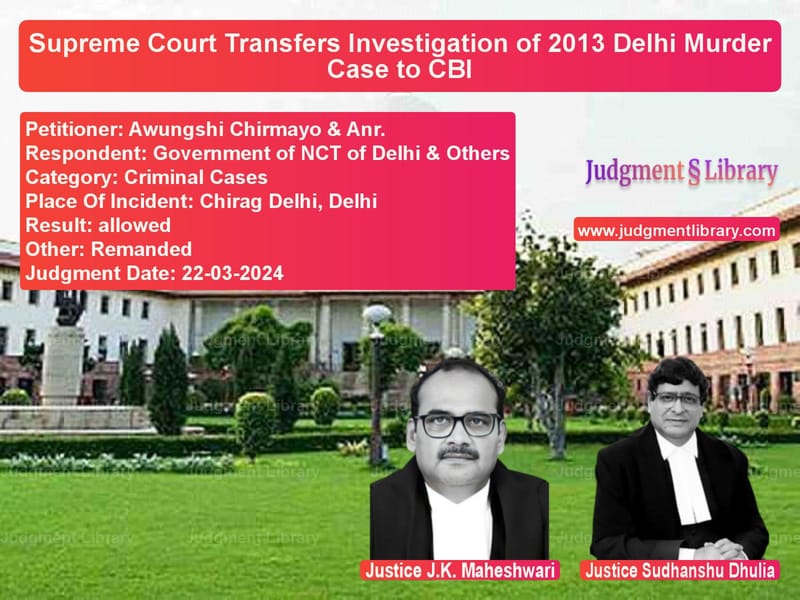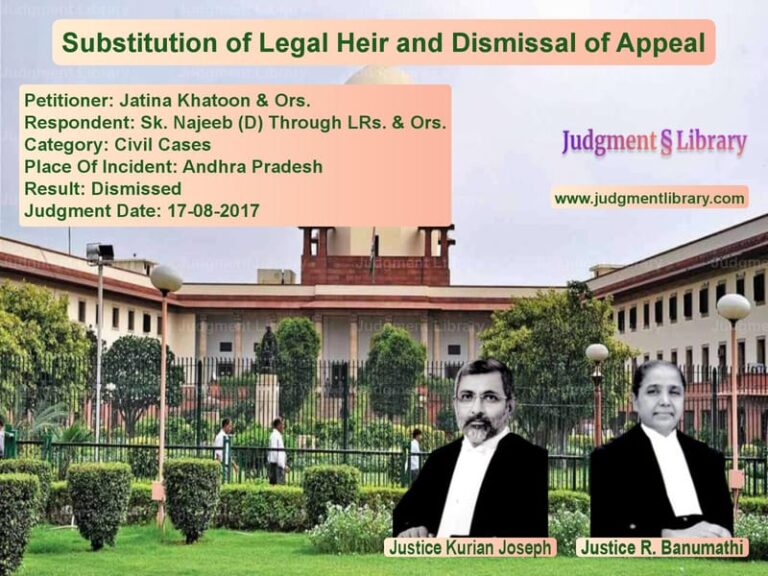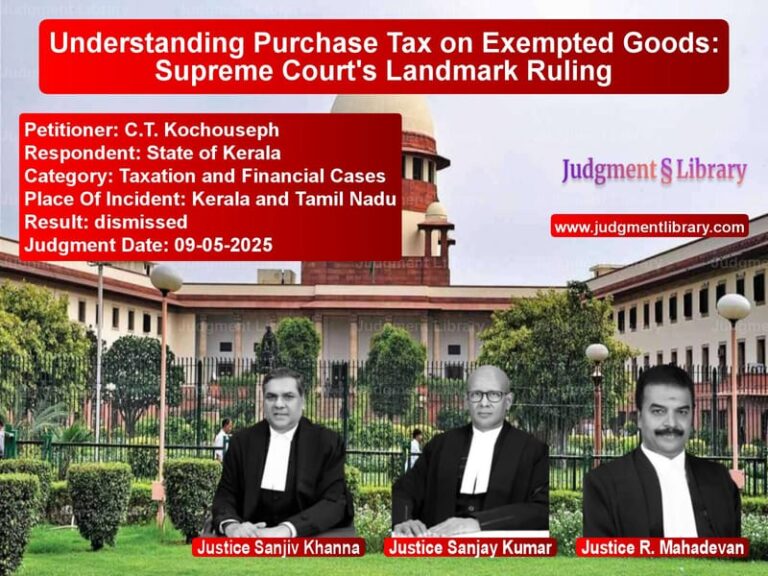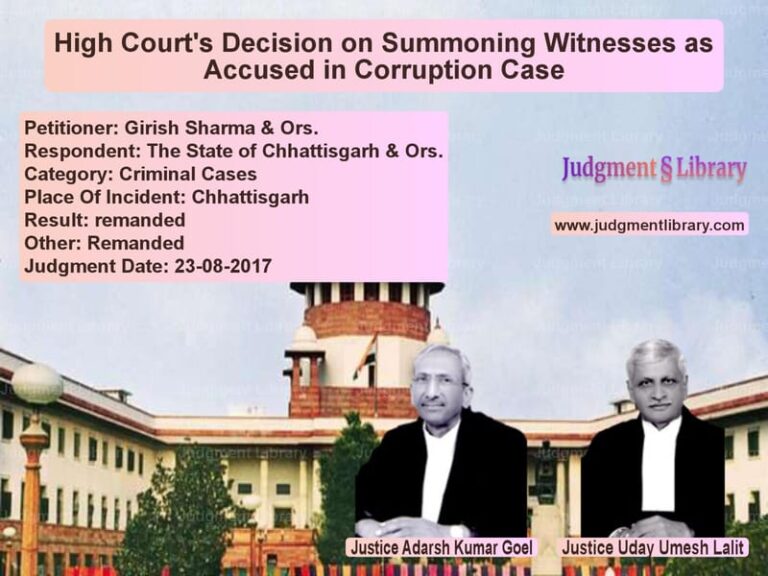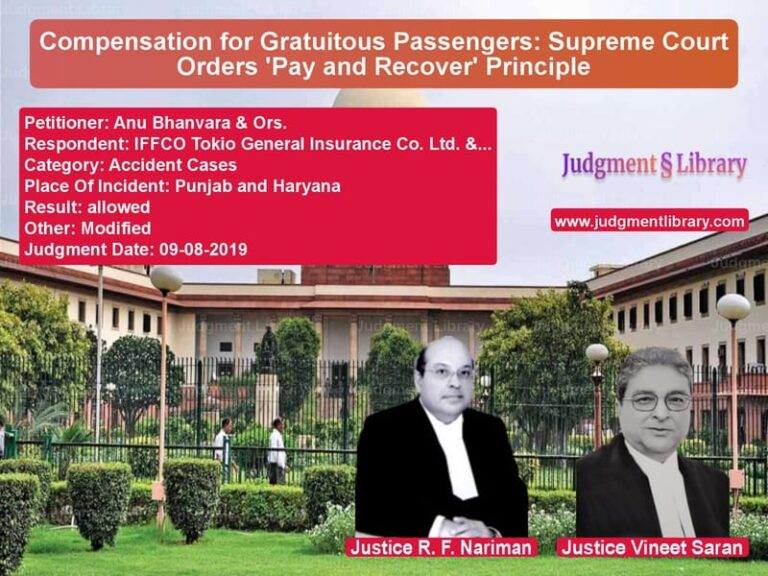Supreme Court Transfers Investigation of 2013 Delhi Murder Case to CBI
The Supreme Court of India has directed the transfer of the investigation into the 2013 suspicious death of a young woman in Delhi to the Central Bureau of Investigation (CBI). The case, Awungshi Chirmayo & Anr. vs. Government of NCT of Delhi & Others, concerns the death of a 25-year-old woman from Manipur, who was found dead in her rented accommodation in Chirag Delhi.
The Supreme Court found significant lapses in the police and Special Investigation Team (SIT) inquiries, including unexplained delays, inconclusive forensic reports, and a lack of clarity on whether the death was a homicide or suicide. The Court ruled that a fair and effective investigation was necessary to bring the perpetrators to justice and restore public confidence.
Background of the Case
The deceased was a 25-year-old woman from Manipur, working at a call center in Delhi. She was found dead in her rented accommodation on May 29, 2013. The post-mortem report revealed disturbing details, including:
- Part of her nose was missing, and the detached piece was found on the left side of her face.
- Nibbling marks were present on both upper eyelids.
- A 5 cm wound was present on her right foot, showing signs of nibbling.
- All wounds were post-mortem in nature.
The cause of death could not be ascertained in the initial post-mortem report.
Delayed and Inconclusive Investigation
1. Delayed FIR and Initial Investigation
- The first police report (Daily Diary Entry No. 20A) was recorded on May 29, 2013, after the landlord discovered the body.
- Despite visible blood splatters in the room, the FIR was registered only on May 31, 2013, initially under Section 306 IPC (abetment to suicide).
- It was later converted to a Section 302 IPC (murder) case following public outcry.
2. Multiple Post-Mortem Reports
- The first post-mortem at AIIMS could not determine the cause of death.
- A second post-mortem on June 4, 2013 at Maulana Azad Medical College noted eleven injuries but still failed to establish a definitive cause of death.
3. High Court’s Dismissal of CBI Investigation Request
- The victim’s family, dissatisfied with the investigation, filed a writ petition in the Delhi High Court seeking a CBI probe.
- The High Court dismissed the petition, citing:
- Polygraph tests of two suspects (Raj Kumar and Amit Sharma) yielded inconclusive results.
- DNA analysis of semen samples found on the deceased’s undergarments did not match any suspects.
- The deceased’s boyfriend, a key person of interest, had absconded and could not be traced.
- No conclusive evidence of murder or abetment to suicide was found.
Supreme Court’s Observations
1. Suspicious Circumstances Around the Death
“Apparently, there seems to be no reason for a young girl of 25 years to commit suicide. Prima facie, it does not seem to be a case of suicide.”
The Court noted the presence of blood splatters and a fully blood-drenched bedsheet, indicating a likely homicidal death.
2. Investigation Lapses
“The investigation was ineffective, raising serious concerns about justice being served. The failure to properly examine key suspects, delay in registering the FIR, and lack of a conclusive cause of death make this case fit for CBI intervention.”
3. Role of the Victim’s Family in Seeking Justice
“The victim’s family, residing far away in Manipur, has faced immense challenges in pursuing justice. Their persistent efforts demonstrate a strong belief in the justice system.”
4. Need for CBI Investigation
Referring to past cases such as State of West Bengal & Ors. vs. Committee for Protection of Democratic Rights (2010) 3 SCC 571, the Court emphasized that a CBI probe should be ordered only in exceptional circumstances.
“We are convinced that this case meets the criteria for a CBI investigation, given the police’s failure to produce credible findings and the need to restore public confidence.”
Final Verdict
The Supreme Court set aside the Delhi High Court’s dismissal of the CBI investigation request and ruled:
“The appeal is allowed. The case is transferred from the Special Investigation Team (SIT) to the CBI for a fresh and thorough investigation. The SIT shall hand over all relevant documents to the CBI, which must complete its investigation expeditiously and file a report before the concerned court.”
Conclusion
The Supreme Court’s ruling is a major victory for the victim’s family, ensuring that the case will be thoroughly reinvestigated. The key takeaways are:
- Delayed FIRs and incomplete investigations weaken justice – Authorities must act swiftly in suspicious death cases.
- Victims’ families deserve fair hearings – The Supreme Court recognized the family’s perseverance in seeking justice.
- CBI intervention is warranted in exceptional cases – When local police investigations fail, higher judicial intervention is necessary.
- Public trust in the justice system must be upheld – The Court ensured that the case would be handled with renewed scrutiny.
This decision marks a crucial step toward accountability and thorough investigation in cases of suspicious deaths.
Petitioner Name: Awungshi Chirmayo & Anr..Respondent Name: Government of NCT of Delhi & Others.Judgment By: Justice J.K. Maheshwari, Justice Sudhanshu Dhulia.Place Of Incident: Chirag Delhi, Delhi.Judgment Date: 22-03-2024.
Don’t miss out on the full details! Download the complete judgment in PDF format below and gain valuable insights instantly!
Download Judgment: awungshi-chirmayo-&-vs-government-of-nct-of-supreme-court-of-india-judgment-dated-22-03-2024.pdf
Directly Download Judgment: Directly download this Judgment
See all petitions in Murder Cases
See all petitions in Bail and Anticipatory Bail
See all petitions in Judgment by J.K. Maheshwari
See all petitions in Judgment by Sudhanshu Dhulia
See all petitions in allowed
See all petitions in Remanded
See all petitions in supreme court of India judgments March 2024
See all petitions in 2024 judgments
See all posts in Criminal Cases Category
See all allowed petitions in Criminal Cases Category
See all Dismissed petitions in Criminal Cases Category
See all partially allowed petitions in Criminal Cases Category

